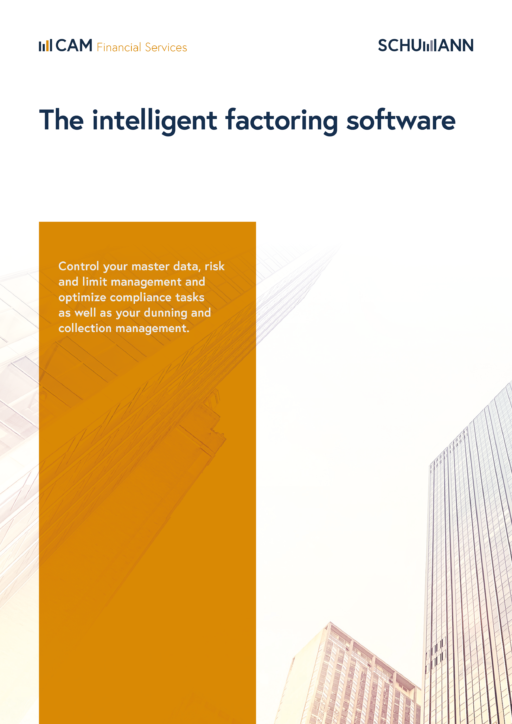The year 2021 brings a positive turnaround for factoring in the waning COVID-19 pandemic. The economy is faced with the task of realising business expansions with liquidity-preserving financing and using this form of financing to avoid increased debt for factoring customers after crisis-related borrowing, because liquidity bottlenecks and a shrinking equity base are a burden on companies.
When deciding to purchase receivables, factoring companies are faced with the task of adequately assessing default risks and countering expected insolvencies in the wake of the economic crisis.
Business expansion with IT solutions
Scaling the business volume of factoring companies for risk-relevant and non-risk-relevant business can be efficiently achieved through IT-supported workflows and automation. Factoring companies aiming to digitise and automate their business processes focus IT investments in the following system solutions: IT support of processes for fast automated limit applications and workflow-supported digital approval processes within a software solution based on integrated data analyses, as well as the use of relevant data and sources with technical interfaces to business partners, information suppliers and trade credit insurances with trustworthy, efficient and transparent processes.
Most important IT investments
The most important IT investments in the factoring industry to prepare for business expansion in the post-COVID-19 pandemic world - in general - are in:
- automation of processes to support fast decisions and business expansion in straight-through-processes,
- digital collaboration with business partners in trustworthy, efficient and transparent processes,
- data analytics and utilization of relevant data sources and utilization of artificial intelligence and machine learning.
The factoring industry faces the challenge of decisively developing new business models for liquidity protection and risk management to ensure the resilience and sustainability of banks and financial institutions, as well as clients, as the economy recovers.
Automation of limit decisions
Software solutions for assessing credit risks and making limit decisions can support factoring companies in mapping their debt purchase processes and avoid findings by regulators in the future.
A technically-supported end-to-end process can start in a client online portal. This is where the purchase and limit applications are made. Through the technical integration of master data checks, KYC including the identification of beneficial owners and fraud prevention processes based on data from specialised information providers, onboarding processes can be streamlined and significantly accelerated in terms of optimal customer satisfaction. Structures, such as the formation of buyer units, can be automatically supported with the IT solution.
Suitable sources of information, e.g., per country and differentiation of risk relevance, can be retrieved automatically. The mapping and aggregation of ratings based on information and financial analyses of a buyer to a uniform rating scale makes risk assessments in the customer and buyer portfolio comparable. The determination of each rating is transparent, documented and historised in an audit-proof manner. Updates of information are automatically carried out, recorded and reported as required.
In addition, when using trade credit insurance, policies must be implemented efficiently and correctly, and limits must be adjusted quickly if necessary. TCI portal technology supports multi-TCI and policy handling, as well as individual and aggregated limit allocation.
In order to introduce fast and integrated processes, a modern implementation of Enterprise Integration Layer connections to internal management systems as well as Application Programming Interfaces (APIs) to decision-relevant information from credit agencies and trade credit insurers are required. Based on triggers and parameters, processes can be controlled and linked in end-to-end solutions. To map risk-relevant and non-risk-relevant transactions, competence tableaus and check-relevant criteria are applied. The time of the decision and the decision-maker are stored in the limit application in order to document the conformity of the limit decision with the rules.
Particularly in times of high uncertainty - such as the COVID-19 pandemic - it must be possible to adapt processes and rules for mapping the credit policy of a factoring company flexibly and quickly to changing conditions. In modern software, this is done with a flexible, integrated workflow management (Business Process Model Notation, BPMN) and with decision engines (Decision Model and Notation, DMN). Processes and sets of rules can be easily configured with this technology. A deep understanding of the procedures in process design is crucial for success.
Effective modelling and successful implementation of factoring processes can be done with the help of an iterative Business Process Management Cycle. Work processes are optimised by making them visualisable, analysable and automatable. Compliance with defined workflows is technically ensured and historised in an audit-proof manner, so that evaluations and monitoring of process executions are possible at any time.
IT-supported approval processes
Professional software also supports multi-stage approval processes for risk-relevant decisions. In each process step, a decision-maker is assigned, and decisions are historicised and documented. The basis for decisions as well as the determination of a limit and rating on the basis of standardised and comprehensible parameters are presented transparently.
Automated process steps differ in process representation within the software from manual user tasks. User tasks can be bound to user rights to prevent unauthorised access. Limit decisions can only be made by back-office staff with appropriately assigned rights.
Manual monitoring of the buyer portfolio and limit decisions is not necessary. The software automatically monitors the entire portfolio in the background and informs the user as soon as new decision-relevant information is available. It also automatically initiates defined alternative actions, such as the triggering of a new decision in the approval process (management by exception). The checks are fully documented, as are the initiated monitoring processes.
Conclusion
In the future, factoring companies will have to react flexibly to the market environment and to regulatory changes. The focus of company audits is increasingly directed towards comprehensible risk audits, complete monitoring, and seamless documentation.
Standardised, IT-supported workflow processes make the application of credit risk policy in the factoring company transparent and facilitate the traceability of risk assessments and limit decisions. Findings by regulators are a thing of the past.

